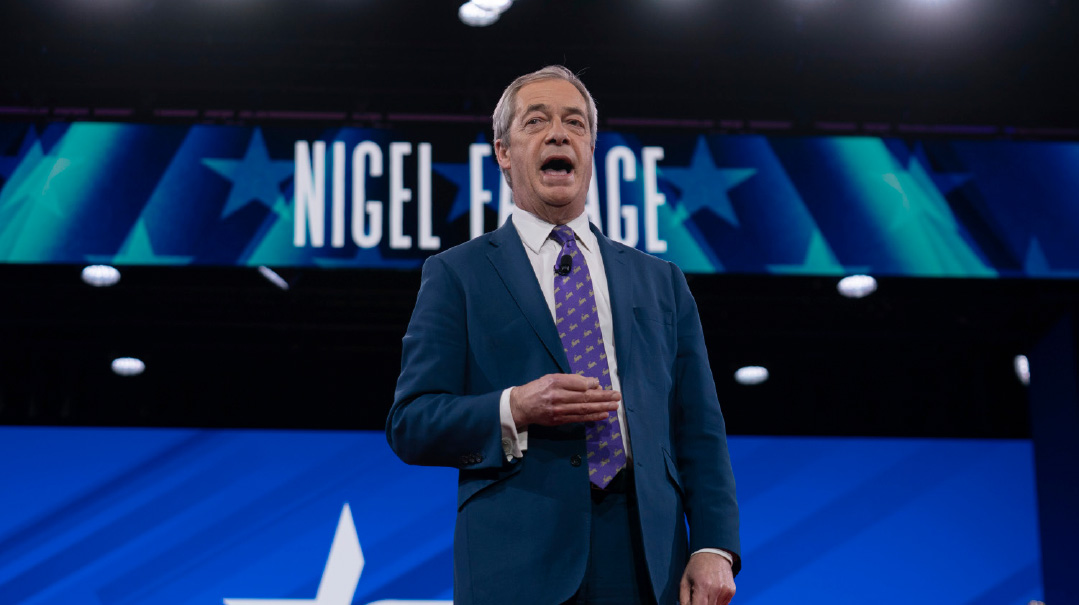Are We Past Peak Corbyn?


Photo: AFP/Imagebank
British Jews anxious over the prospect of an unapologetically anti-Semitic prime minister may have tentative cause for optimism. Although Jeremy Corbyn — an avowed friend of Hamas and Hezbollah — remains firmly in control of the UK’s Labour Party, one new poll shows Conservative incumbent Theresa May opening up a six-point lead over her controversial challenger. Previous surveys had shown the race deadlocked, or gave Labour a slight advantage.
For Corbyn, the political ground seems to have shifted due to a combination of his own baggage finally weighing him down, and shrewd political moves by May. Although Corbyn rose to the Labour helm even as he weathered repeated revelations of his associations with some very bad people, the chickens now appear to have come home to roost. And by committing to end the austerity measures forced on the government by the 2008 financial crisis, May has poached Corbyn’s most potent political weapon.
The Conservative and Labour party conferences that took place over the last two weeks came against this backdrop. The Labour conference that was held in Liverpool, where local politics are dominated by hard-left Corbynistas, showcased a self-assured Jeremy Corbyn now in full control of his party. To adoring chants of “Oh Jeremy Corbyn” from the faithful, he used his keynote conference speech to flesh out his mantra of Labour as a party “for the many, not the few.” Promising to renationalize key industries and get tough with Donald Trump, Corbyn is now confident enough to lead Labour further to the left than it has been for decades.
But for the UK Jewish community, Corbyn’s economic policies are not as worrying as his attitudes toward Jews and Israel. Accusations of endemic anti-Semitism within Corbyn’s Labour have made international headlines all summer. His palliative remarks on the subject at the conference hardly stilled those fears. Corbyn acknowledged the “immense hurt and anxiety in the Jewish community,” but said only that “I hope we can work together to draw a line under it,” ignoring the fact that he himself is personally accused of anti-Semitism.
So what would life under a Prime Minister Corbyn actually be like? Labour Friends of Israel lay chairman Adrian Cohen told Mishpacha that Corbyn in power “could be a very uncomfortable experience for the Jewish community. Based on experience to date, they may consciously undermine our mainstream Jewish institutions, and we’d be put in a classic shtadlanut position with a supplicant type of relationship.”
As for Israel, given that the Palestinian narrative dominates Corbyn’s thinking, “things could get confrontational very quickly. It may well be that diplomatic relations with Israel wouldn’t last long, and there’d probably be accusations of dual loyalty against British Jews.”
Given the clear danger that a Corbyn government would pose, what are the chances of a fightback by Labour moderates against the Corbynite takeover? According to Luke Akehurst, secretary of the moderate Labour group Labour First and director of the pro-Israel group We Believe in Israel, there are buffers against Corbyn’s rise within Labour, but a return to Labour centrism is not in the cards in the near future.
“More than 200 of Labour MPs and at least two-thirds of municipal councilors are not sympathetic to his agenda,” explains Akehurst. “But he has captured all the key institutions within the party. Jeremy Corbyn has brought in four-fifths of Labour’s current membership. That could be reset if a charismatic moderate candidate came along, but there doesn’t seem to be an appetite for a leadership challenge against Corbyn.”
But if Britain’s second biggest party has turned hostile to Israel and Jews, recent polls hold out hope that Corbyn’s march to Downing Street has been slowed. The latest YouGov poll shows the Conservatives leading Labour 42% to 36%, for the first time since last year’s general election. Some observers think that “peak Corbyn” has been reached.
Indeed, it seems that beyond Corbyn’s true believers, he is now a liability to his party, as his personal popularity has plummeted. A pre-conference Ipsos-MORI poll shows that only 24% of the general public feels that Corbyn is doing a good job, down from 42% in October last year. Part of that nosedive may be due to relentless media scrutiny of Corbynite anti-Semitism. Another YouGov poll shows that a third of Britons think that both Corbyn and Labour are anti-Semitic — an astounding result given that Labour has historically been seen as the anti-racist party.
According to Luke Akehurst, the polls reflect the fact that many people who voted for Jeremy Corbyn in 2017 did so in protest against Brexit and austerity, never believing that he would do so well. “Confronted with the question, ‘Would you want this person as prime minister?’ most people don’t see that as plausible.”
Ultimately, though, Corbyn’s fortunes depend on the Conservatives now in power. At their conference, further south in the Midlands city of Birmingham, the bitter infighting over the direction of Brexit was on full display. Former foreign secretary Boris Johnson, a superstar of the Brexiteer right, drew cheers as he called to “chuck Chequers,” referring to the prime minister’s Brexit plan. But the next day Theresa May gave her strongest speech as leader, the core of which was a new Conservative strategy to defeat Corbyn.
According to Matthew Goodwin, professor of politics at the University of Kent, Theresa May’s initial popularity stemmed from her support for Brexit, restrictions on immigration, and a promise to do more for workers and tackle “burning injustices.” She lost ground to Corbyn when it became clear that these ideas wouldn’t be translated into action. May acknowledged as much in her conference speech, and stole Corbyn’s best policy, vowing to end austerity.
“A decade after the financial crash,” she said, “people need to know that the austerity it led to is over and that their hard work has paid off.” Other than a pledge to massively increase the rates of house-building, details were scarce. But in a sign of how threatening this policy change is for Corbyn’s hopes, Labour hit back immediately, calling May’s austerity pledge a “complete con.”
The next polls will show whether the gap between the parties is here to stay. But beyond the cult of Corbyn on display at its party conference, Labour’s biggest liability may be its leader. And the great hope for the Conservatives and the UK might lie in a strategic loosening of the public purse strings.
Britain under Comrade Corbyn
Compulsory purchase
All companies with more than 250 workers would have to transfer 10% of shares to employees
Nationalizing
Corbyn would borrow billions to renationalize the rail, mail, and energy networks in a bid to reverse decades of Thatcherism
Second home tax
“Think of it as a solidarity fund for those with two homes to help those without any home at all”
Breaking with Trump
Attacking the “America First posturing of Donald Trump,” Corbyn would likely bring an end to the UK-US special relationship
Recognizing Palestine
“We will recognize a Palestinian state as soon as we take office”
(Originally featured in Mishpacha, Issue 730)
Oops! We could not locate your form.













